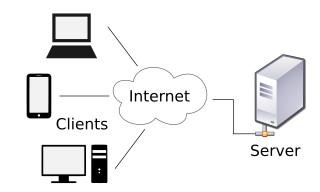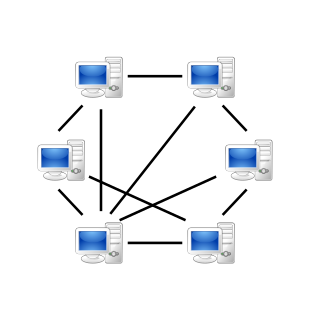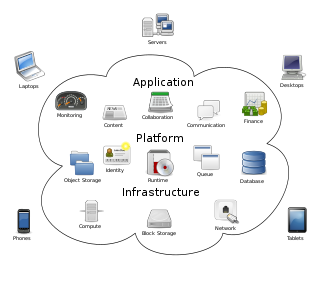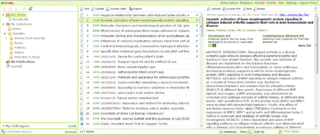Related Research Articles

Client–server model is a distributed application structure that partitions tasks or workloads between the providers of a resource or service, called servers, and service requesters, called clients. Often clients and servers communicate over a computer network on separate hardware, but both client and server may reside in the same system. A server host runs one or more server programs, which share their resources with clients. A client usually does not share any of its resources, but it requests content or service from a server. Clients, therefore, initiate communication sessions with servers, which await incoming requests. Examples of computer applications that use the client–server model are email, network printing, and the World Wide Web.
Information security, sometimes shortened to InfoSec, is the practice of protecting information by mitigating information risks. It is part of information risk management. It typically involves preventing or reducing the probability of unauthorized/inappropriate access to data, or the unlawful use, disclosure, disruption, deletion, corruption, modification, inspection, recording, or devaluation of information. It also involves actions intended to reduce the adverse impacts of such incidents. Protected information may take any form, e.g. electronic or physical, tangible or intangible. Information security's primary focus is the balanced protection of the confidentiality, integrity, and availability of data while maintaining a focus on efficient policy implementation, all without hampering organization productivity. This is largely achieved through a structured risk management process that involves:

Peer-to-peer (P2P) computing or networking is a distributed application architecture that partitions tasks or workloads between peers. Peers are equally privileged, equipotent participants in the application. They are said to form a peer-to-peer network of nodes.

Academic publishing is the subfield of publishing which distributes academic research and scholarship. Most academic work is published in academic journal articles, books or theses. The part of academic written output that is not formally published but merely printed up or posted on the Internet is often called "grey literature". Most scientific and scholarly journals, and many academic and scholarly books, though not all, are based on some form of peer review or editorial refereeing to qualify texts for publication. Peer review quality and selectivity standards vary greatly from journal to journal, publisher to publisher, and field to field.
Reference management software, citation management software, or bibliographic management software is software for scholars and authors to use for recording and utilising bibliographic citations (references) as well as managing project references either as a company or an individual. Once a citation has been recorded, it can be used time and again in generating bibliographies, such as lists of references in scholarly books, articles and essays. The development of reference management packages has been driven by the rapid expansion of scientific literature.
Code review is a software quality assurance activity in which one or several people check a program mainly by viewing and reading parts of its source code, and they do so after implementation or as an interruption of implementation. At least one of the persons must not be the code's author. The persons performing the checking, excluding the author, are called "reviewers".
SCIgen is a paper generator that uses context-free grammar to randomly generate nonsense in the form of computer science research papers. All elements of the papers are formed, including graphs, diagrams, and citations. Created by scientists at the Massachusetts Institute of Technology, its stated aim is "to maximize amusement, rather than coherence." Originally created in 2005 to expose the lack of scrutiny of submissions to conferences, the generator subsequently became used, primarily by Chinese academics, to create large numbers of fraudulent conference submissions, leading to the retraction of 122 SCIgen generated papers and the creation of detection software to combat its use.
Multimodal interaction provides the user with multiple modes of interacting with a system. A multimodal interface provides several distinct tools for input and output of data.
A Web API is an application programming interface for either a web server or a web browser. It is a web development concept, usually limited to a web application's client-side, and thus usually does not include web server or browser implementation details such as SAPIs or APIs unless publicly accessible by a remote web application.
Abstract management is the process of accepting and preparing abstracts for presentation at an academic conference. The process consists of either invited or proffered submissions of the abstract or summary of work. The abstract typically states the hypothesis, tools used in research or investigation, data collected, and a summary or interpretation of the data.
The Free Software Directory (FSD) is a project of the Free Software Foundation (FSF). It catalogs free software that runs under free operating systems—particularly GNU and Linux. The cataloged projects are often able to run in several other operating systems. The project was formerly co-run by UNESCO.

The Web Conference is a yearly international academic conference on the topic of the future direction of the World Wide Web. The first conference of many was held and organized by Robert Cailliau in 1994 at CERN in Geneva, Switzerland. The conference has been organized by the International World Wide Web Conference Committee (IW3C2), also founded by Robert Cailliau and colleague Joseph Hardin, every year since. The conference's location rotates among North America, Europe, and Asia and its events usually span a period of five days. The conference aims to provide a forum in which "key influencers, decision makers, technologists, businesses and standards bodies" can both present their ongoing work, research, and opinions as well as receive feedback from some of the most knowledgeable people in the field.
EasyChair is a free web-based conference management software system used, among other tasks, to organise paper submission and review. EasyChair is widely used, since 2002, in the scientific community, with reportedly more than two and a half million users in 2019.

Cloud computing is the on-demand availability of computer system resources, especially data storage and computing power, without direct active management by the user. Large clouds often have functions distributed over multiple locations, each location being a data center. Cloud computing relies on sharing of resources to achieve coherence and economies of scale.
An application programming interface (API) is a connection between computers or between computer programs. It is a type of software interface, offering a service to other pieces of software. A document or standard that describes how to build such a connection or interface is called an API specification. A computer system that meets this standard is said to implement or expose an API. The term API may refer either to the specification or to the implementation.

WizFolio was a web-based reference management software for researchers to manage, share their research and academic papers and generate citations in scholarly writings. It used plug-ins to collect bibliographic information, videos and patents from webpages. WizFolio ceased to be available at the end of 2017.
Software-defined networking (SDN) technology is an approach to network management that enables dynamic, programmatically efficient network configuration in order to improve network performance and monitoring, making it more like cloud computing than traditional network management. SDN is meant to address the fact that the static architecture of traditional networks is decentralized and complex while current networks require more flexibility and easy troubleshooting. SDN attempts to centralize network intelligence in one network component by disassociating the forwarding process of network packets from the routing process. The control plane consists of one or more controllers, which are considered the brain of the SDN network where the whole intelligence is incorporated. However, the intelligent centralization has its own drawbacks when it comes to security, scalability and elasticity and this is the main issue of SDN.
Ex Ordo is cloud-based conference management software for association and academic conferences, congresses and symposia. Ex Ordo combines a core abstract management functionality with a registration system, scheduling software, and a mobile conference app. It is used by conferences in 58 countries across a wide set of research fields.
A distributed file system for cloud is a file system that allows many clients to have access to data and supports operations on that data. Each data file may be partitioned into several parts called chunks. Each chunk may be stored on different remote machines, facilitating the parallel execution of applications. Typically, data is stored in files in a hierarchical tree, where the nodes represent directories. There are several ways to share files in a distributed architecture: each solution must be suitable for a certain type of application, depending on how complex the application is. Meanwhile, the security of the system must be ensured. Confidentiality, availability and integrity are the main keys for a secure system.

Stephen John Young is a British researcher, Professor of Information Engineering at the University of Cambridge and an entrepreneur. He is one of the pioneers of automated speech recognition and statistical spoken dialogue systems. He served as the Senior Pro-Vice-Chancellor of the University of Cambridge from 2009 to 2015, responsible for Planning and Resources. From 2015 to 2019, he held a joint appointment between his professorship at Cambridge and Apple, where he was a senior member of the Siri development team.
References
- ↑ Tewari, T.; Singh, S. (2010-05-07). "Survey of Conference Management Systems".Cite journal requires
|journal=(help) - ↑ Scholarly Communications: Open Access for Researchers (PDF). United Nations Educational, Scientific and Cultural Organization (UNESCO). 2015-02-04. p. 28.
- ↑ Dunham, Tim (2011-03-30). "Zakon Group's OpenConf Goes Multilingual". Conway Daily Sun. Retrieved 2016-01-19.
- ↑ "IEEE Preferred Peer-Review Service Network Partner". IEEE. IEEE. Retrieved 2016-01-18.
- ↑ Hasan, L; Abuelrub, E (2013-02-16). "Usability Testing for IAJIT OpenConf Journal Management System" (PDF). Journal of Software. 8 (2). doi:10.4304/jsw.8.2.387-396.
- ↑ "The Top 12 Free and Open Source Event Management Software". Capterra Blog. Capterra. Retrieved 2016-01-18.
- ↑ Schur, M.; Roth, A.; Zeller, A. (2013-11-18). "Mining Behavior Models from Enterprise Web Applications" (PDF). Esec/Fse.
- ↑ Doran, P.; et al. (2009-05-28). "A space reduction mechanism for the dynamic selection of ontological alignments" (PDF).Cite journal requires
|journal=(help) - ↑ Di Mauro, N.; Basile, T.; Ferilli, S. (2005). "GRAPE: An Expert Review Assignment Component for Scientific Conference Management Systems". Innovations in Applied Artificial Intelligence. Lecture Notes in Computer Science. 3533: 789. doi:10.1007/11504894_109. ISBN 978-3-540-26551-1.